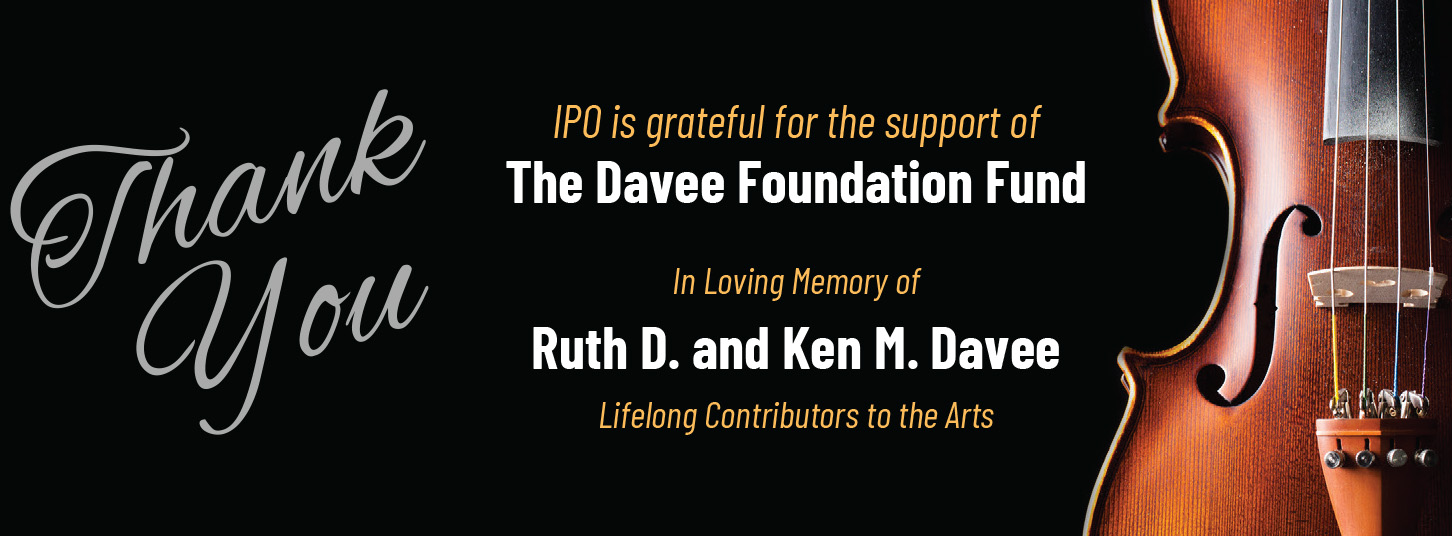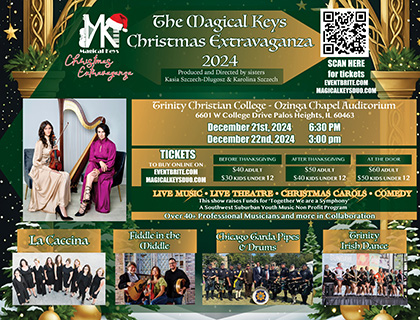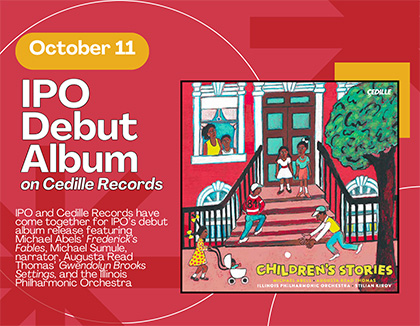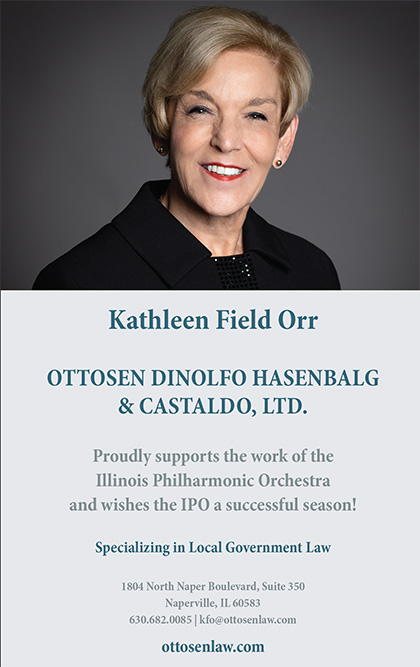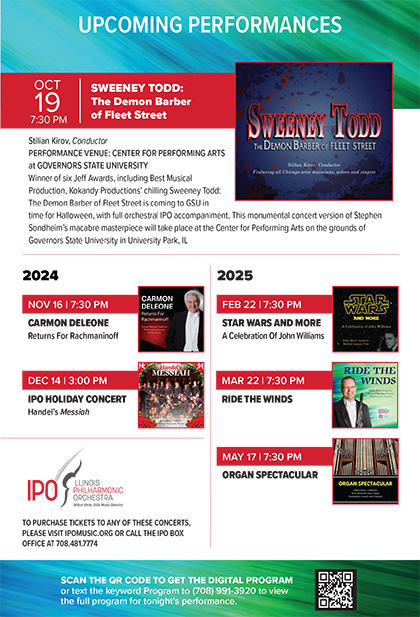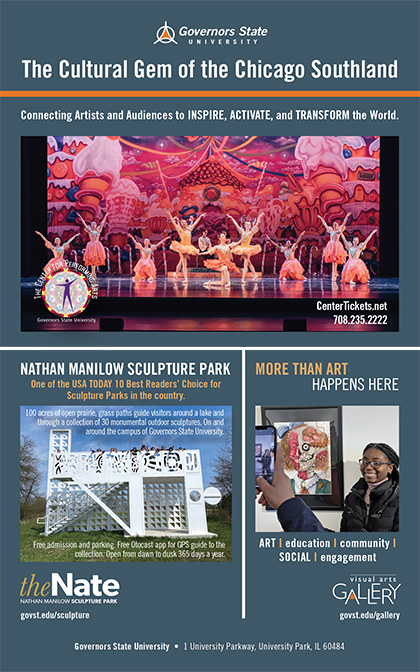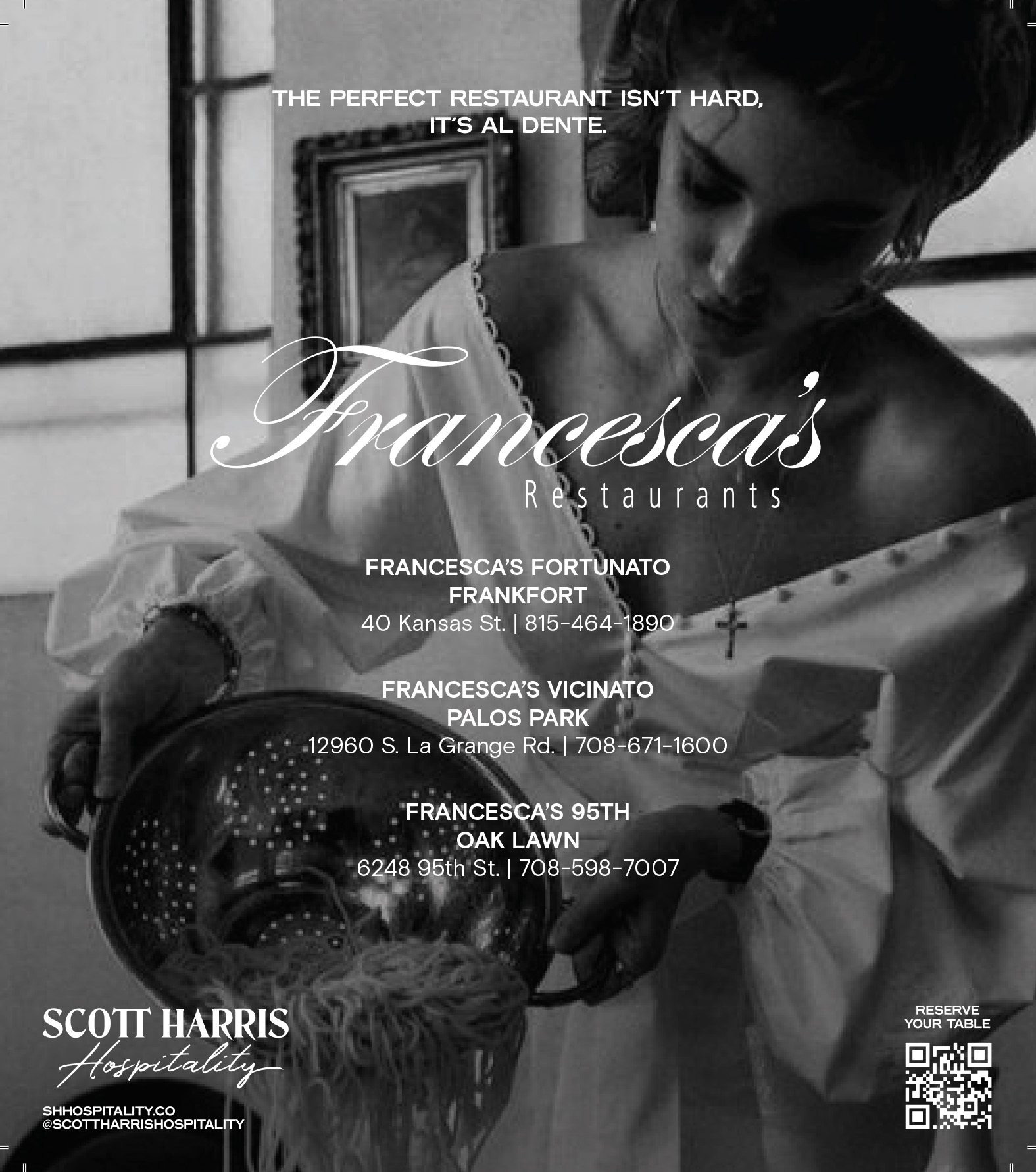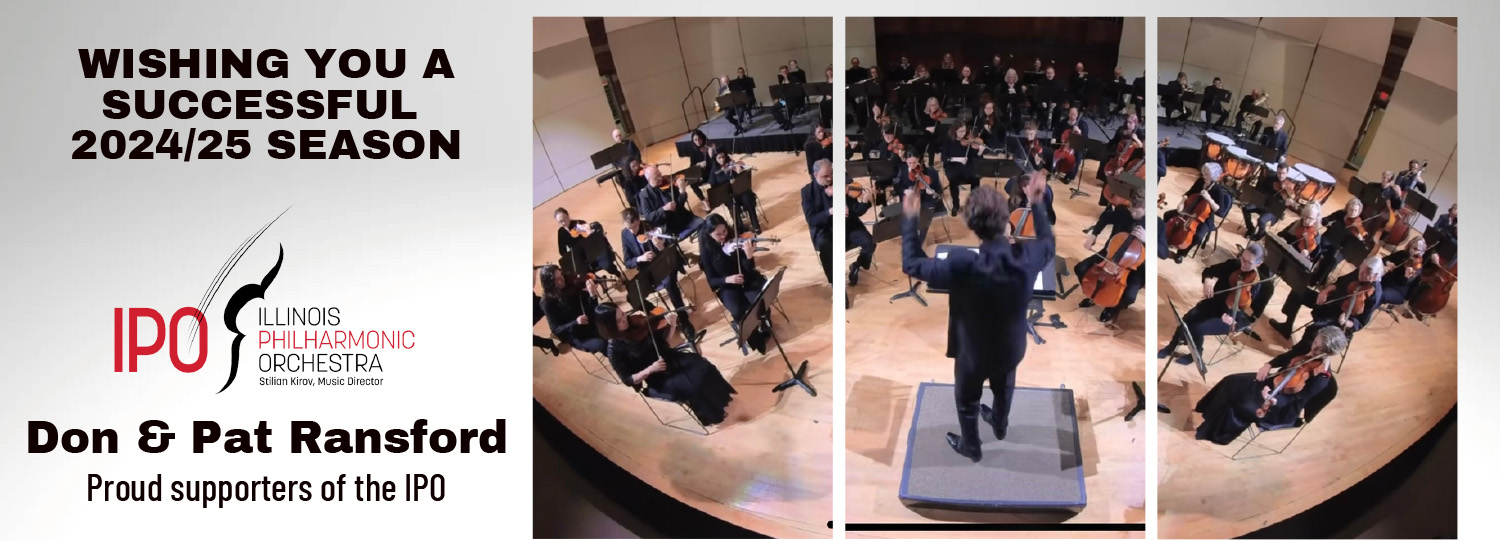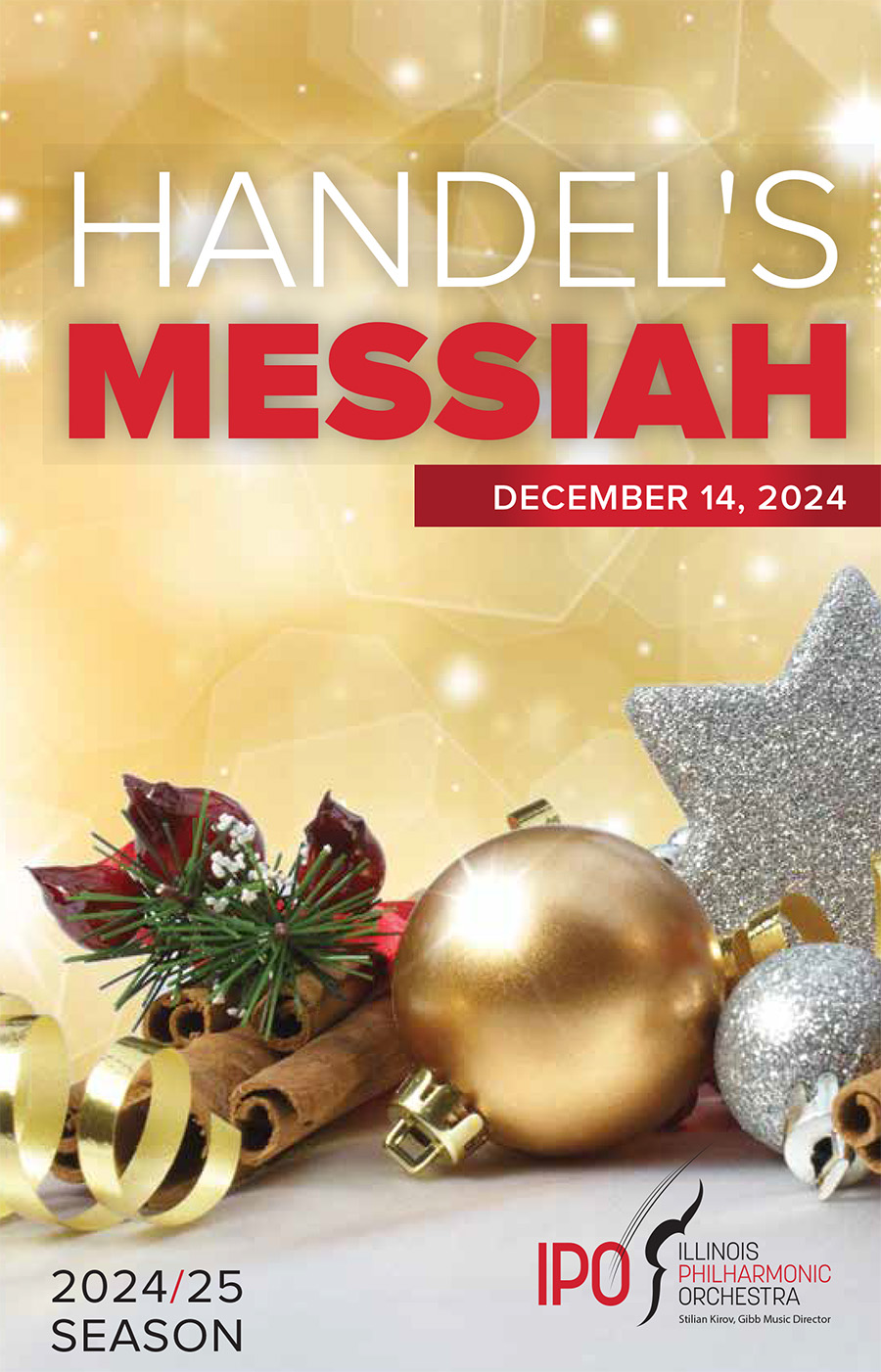

Stilian Kirov, Conductor
Emily Richter, Soprano
Lucy Baker, Mezzo-Soprano
Travon D. Walker, Tenor
Christopher Humbert, Jr., Baritone
Chicago Community Chorus, Dr. Keith Hampton, Artistic Director / Founder
Tonight’s Concert sponsored by
Messiah | George Friedrich Händel | |
Part One | ||
Intermission | ||
Part Two | ||
| Part Three | ||
| Encore | ||
Opening Act Lobby Performers
Bloom Township High School District 206 Show Choir
Contact: Diana Harigan • dharrigan@sd206.org
Programs and artists subject to change
Messiah,
George Friedrich Händel
(1685-1759)
Today, it is difficult to imagine the concert scene as it existed in the 18th century when George Frideric Handel (1685-1759) premiered Messiah in Dublin, Ireland during Lent, 1742. Novelty was all. A “premiere” was not an exotic event that would be sprinkled among revivals. The premieres were expected. The idea of a canon of masterpieces which were performed repeatedly was unknown. Messiah, in the decade after its premiere, became a yearly staple of London’s concert life as a charity benefit. It is the single work that inaugurated the classical canon of recurrently revived masterpieces.
Handel was the Saxon-born, Italian-trained, British subject who was an entrepreneur who lived from his ticket sales. Originally, he was overwhelmingly successful with the wildly popular Italian operas he produced in London including Rinaldo (1711) and Giulio Cesare (1724). These operas not only featured a parade of virtuosic arias, including those sung by famous castratos and divas, but also had choruses – all in Italian and all “opera seria” -- serious subjects treated seriously. The whole panoply of human emotions was gloriously expressed, but from an elevated plane.
However, the problem with the emphasis on novelty is that there is always the chance that someone will be “newer” than you. Handel’s operatic obsolescence came with the premiere of John Gay’s The Beggar’s Opera (1728), a series of ballads relating the antics of an underclass of thieves and lovers which punctured the pretentions of the reigning Italian opera culture. It had 62 consecutive performances in a time that 14 would be a great success.
No, Handel didn’t start writing ballads, but he did stop writing Italian operas. He invented the English-language oratorio which set biblical stories in a very operatic fashion with recitatives, arias, and choruses but without staging. It should be emphasized that these were “Old Testament” stories like Saul (1738) and Isreal in Egypt (1738–39) -- never Gospel stories – until Messiah.
Messiah was the idea of the librettist Charles Jennens. Jennens formulated a masterful meditation on the life of Jesus but obliquely through biblical verses which describe his prophecy, life, and mission but do not have Biblical characters singing directly (except the angels announcing the Birth in the chorus “Glory to God”). Jennens drew approximately 60% of the text from the Old Testament and perhaps that is why he titled his work “Messiah.” While Messiah is more often than not performed at Christmas time, Jennens illuminates the whole of Jesus’s life. Messiah is in three “Parts” with the First dealing with the Birth, the Second with the Death, and the Third with the Resurrection of Jesus.
What is astonishing is that Handel wrote the music in only 24 days in the summer of 1741. As was the practice of the time, Handel “repurposed” earlier compositions to complete the work (which is why the chorus “FOR unto us a child is born” is accented unidiomatically – the parsing is perfect in the original Italian duet). Handel knew that he had written inspired concert music that would elevate the listeners and not merely entertain. Shocking us, Jennens was not very appreciative of the music, but we can refer to unimpeachable authorities – Mozart: “When [Handel] chooses, he strikes like a thunderbolt,” and Beethoven: “[Handel] was the greatest composer that ever lived.”
Program Note by IPO Board Member
Charles Amenta, M.D.
What you are about to read is a playlet designed to introduce our audience to some aspects of Messiah. This piece of work was created by IPO Board Member Charles Amenta, M.D.
Enjoy this “theater of the mind” playlet!
In Handel’s Apartments
George Frideric Handel: No good deed goes unpunished. Here I have written my greatest music, on the greatest subject, asking no personal profit. This Dublin premiere performance is a production for charity. And what is my reward? A crazy man wants to cancel all this because it is immoral. And who is it that’s blocking me? The famous Jonathan Swift, author of Gulliver’s Travels and “A Modest Proposal.” “A Modest Proposal” where he suggested that the British eat young Irish infants to solve the problems of the potato famine. He can publish that outrageous, disgusting satire, and I can’t perform my “Messiah”? He, the dean of St. Patrick’s Cathedral, forbids the participation of the cathedral choir because it is immoral to depict the Lord on stage in the theater. My work is “debasing the scriptures for an entertainment.”
I wrote “Messiah” in 24 days in a burst of inspiration. I truly did think I saw all heaven before me and the great God himself, at times. And the open dress rehearsal here in Dublin was so rapturously received that the theater proprietors are telling women to wear plain skirts without hoops and men to keep their swords at home so that more can attend for the charity. And what reports from the rehearsal! (Sotto voce) Even better than seeing God. [reading]
Mr. Handel’s new sacred Oratorio, which in the opinion of the best Judges, far surpasses anything of that Nature, which has been performed in this or any other Kingdom.” “Words are wanting to express the exquisite Delight it afforded to the admiring crouded Audience. The Sublime, the Grand, and the Tender, adapted to the most elevated, majestick and moving Words, conspired to transport and charm the ravished Heart and Ear”
Voice: Mrs. Cibber, maestro.
GFH: Oh heavens, no!
Susannah Maria Cibber: Mr. Handel. Beloved Maestro!
GFH: Mrs. Cibber you have visited me at the most inopportune time.
SMC: But my dear Mr. Handel, I’m here to ask a favor about the music. I have a great idea.
GFH: Only for an actress as fine as you with such a wonderful voice—would I suffer your complete ignorance of musical notation. I’ve thrown sopranos out the window for much less than I have had to put up with because of you. I have to pound every note into your head.
SMC: Thank you Maestro, you won’t be disappointed.
GFH: But what is this idea.
SMC: You know that aria, “Rejoice!” [sings a bit of the opening]
GFH: [dryly] Yes, I think I remember it.
SMC: Well, I’ve had a few problems with the runs as you may remember. [Sings a bit of this]
GFH: You will be fine.
SMC: Well, I can help you make it even finer. What if we did it as a jig! A jig is joyous! A jig is Irish! A
GFH: [interrupting] A jig is easier to sing.
SMF: Esattamente!
GFH: Spare me the Italian. I thought I was free of it and those divas when I invented English Oratorio to replace it. Those divas! Expensive! And they would pull each other’s hair and call each other “whore,” and worse, even feuding on stage.
SMC: Well, we proper English actresses would never stoop to that.
GFH: Mrs. Cibber, your life has not exactly been hidden from public view
SMC: You mean my little disagreement about that one role…
GFH: You desired the role of Polly in that foul, ridiculous, licentious—"Beggar’s Opera,” that monstrosity that mocked my operas and played for a gazillion performances bankrupting my Italian Opera company…
SMC: Maestro, you’re turning red!
GFH: Where was I?
SMC: Never mind…
GFH: Ah yes. When the part of Polly in that—"Beggar’s Opera,” that monstrosity [catches himself] became available, you actually fought another actress for it. You were worse than the diva’s!
SMC: Oh, maestro!
GFH: They even made up another one of those stupid ballad musicals--about your fight!
SMC: Oh maestro! [pause] But you’d have to agree that triplets in “Rejoice” would be wonderful [Sings]
GFH: Those are not triplets! You see the meter would change and… Oh never mind. Could we just play Messiah as I wrote it, at least once? I hope that we will have performances in London next season and then we can see about adjustments. You know I’m flexible.
SMC: London, that would be wonderful!
GFH: Yes, London after Dublin. But we must get you out of here! You’re the last person I need. I’m sure the Dean will have an attack of apoplexy if he were to see you.
SMC: The Dean?
GFH: Dean Swift of St. Patrick’s Cathedral wants to withdraw his choir because of our use of scripture in the theater. I’m going to try to convince him to approve this. And if he were to see me alone with an actress…
SMC: My dear Mr. Handel. You don’t have any reputation as a ladies’ man. [Laughing] Far from it.
GFH: Be that as it may. My life is private. Your, ahem, marital history, is known to everyone.
SMC: Oh Mr. Handel!
GFH: You were sued for divorce for unfaithfulness! And your husband asked for monetary damages! Your defense, and one worthy of a great actress I might say, was that your husband pulled a gun on you and forced you to have carnal relations with that man.
SMC: Well, my regular audience would have believed it. Anyway, I must have convinced some in that low-life jury because they only awarded the guttersnipe 10 pounds.
GFH: That was the first trial! When you ran off with the man and had his baby, your husband got 500 pounds for your “abduction.”
SMC: That blackguard! That capon!
GFH: So you see…
SMC: Please do not worry. I’m sure the Emerald Isle has no idea about my past.
Voice: [announcing] The Very Reverend Dean Swift
GFH: Mein Gott!
SMC: Don’t worry maestro. I’ll charm him.
GFH: [Below his breath] Make as fast an exit as you can. [Aloud] Dean Swift.
Jonathan Swift: Mr. Handel, I presume.
GFH: Mrs. Cibber.
JS: [pauses, stunned] May God forgive you!
GFH: [softly] Mein Gott!
SMC: [smiling brightly] Thank you, Your Reverence!
JS: I thought we would be discussing this—entertainment--of yours, alone.
GFH: Mrs. Cibber had a musical question, but she is leaving now.
SMC: Oh, Your Reverence, it is much more than an entertainment. You really must attend the performance. The music is so heavenly, so respectful--and edifying. It makes me know the Bible even better than I did before.
GFH: [Motioning toward the door] Mrs. Cibber, I think the Dean…
JS: Mrs. Cibber, don’t we have churches and cathedrals for that? I presume you have attended those. That’s the basic issue. If one wants to learn about the Almighty, the clergy are more than capable of providing that instruction. The theater can stick to Cleopatra and shepherdesses and the like.
SMC: But your Reverence, music can inspire more than words. It can make the words magnificent and lead right to the heart. You can say “Glory to God and Peace on Earth” but when Mr. Handel makes it musical you can see the angels above and feel the peaceful earth below.
[Sings that phrase of the Chorus]
[smiling] I remember a church speech, a real sermon, “I have no use for cranks who despise music, because it is a gift of God. Music drives away the devil and makes people gay; they forget thereby all wrath, unchastity, arrogance, and the like. “
JS: That was Luther in translation, Mrs. Cibber.
GFH: Mein Gott!
JS: Tell me, Mrs. Cibber. Who plays Jesus in this entertainment. You or some castrato?
SMC: Oh no, Your Reverence. Nobody plays any characters.
JS: I thought you just had the angels singing
GFH: Mrs. Cibber, in her uniquely helpful way, picked the one brief time in a 2 1/2-hour piece when there is any singing by any biblical personage. Dean Swift, I think the fact that there are no characters—no dramatis personae so to speak--will be the most reassuring aspect of this performance. Mr. Charles Jennens, in the most ingenious manner possible, selected wonderful Biblical texts that point to the birth of the Messiah, that describe that birth, that reveal the importance of His sacrifice, then the wonder and exultation in His life after death, and finally the firm belief that we now have hope for our own life after death.
JS: So, it’s indirect then?
SMC: Oh yes, very indirect. I can imagine that a Mohammedan or even an atheist would be moved because it’s about a wonderous birth, a mighty sacrifice for others, and the comfort we all need in facing death. It’s not like some dusty prayer.
JS: So, it’s not Christian!
SMC: It is. But it’s not Church Christian. It’s [pause] everybody Christian.
JS: You speak of a theology of which I am unfamiliar and not inclined to endorse, Mrs. Cibber.
GFH: Dean Swift, what Mrs. Cibber is trying to convey, I presume, is that while it most definitely is not a Christian service with a Christian sermon, every word is from the Bible in the most respectful manner. But, there are psalms--a universal poetry. There is prophecy from the Old Testament—which all can understand in its universal sacredness emphasizing a universal desire for purification and redemption. There are meditations and celebrations from the New Testament. It’s direct if you believe and indirect if you don’t, yet. When you wrote your brilliant, “Modest Proposal” you didn’t come out and preach, “It is barbaric to leave the Irish to starve. We British must do something about them. And here are the measures I propose to help their situation.” Of course, your way of writing was more powerful than direct preaching.
JS: [Coldly] That was a satire. I presume you do not satirize the Bible.
GFH: No, of course not.
SMC: Maestro, I now think it’s more direct than indirect as we had put it. Take the wonderful inspiration of your Hallelujah Chorus. When the sopranos go up and up and up praising the “King of Kings and Lord of Hosts” it’s direct!
[Sings that passage]
JS: Very lovely.
SMC: And in that chorus, “All we like sheep,” you can feel the sheep going astray, wandering off. One can preach about the prodigal son
GFH: [aside] She would mention that.
SMC: But when you hear it.
[sings a passage—"gone astray”]
It really touches you directly. You don’t have to think about it and try to figure it all out.
JS: These are just composer’s tricks. You don’t need a heavenly shepherd for those sheep. And you don’t need the St Patrick’s Cathedral Choir for your entertainment.
GFH: But I finish with a perfect church fugue for the Chorus on “Amen.” I need your Cathedral Choir. While I grant you, the basic format is operatic, the art contains much counterpoint inspired by church music. And the choruses, especially the last, have much stile antico.
SMC: That means “old style.”
JS/GFH: [Together] Thank you Mrs. Cibber.
GFH: Opens a score. You can see the independent vocal lines. What can be more sacred than “Amen”?
[We hear the opening of the Amen Chorus]
JS: That’s all fine and good, but…
SMC: [Starts singing, “I know that my redeemer liveth”]
JS: Very lovely
SMC: [Starts singing “How beautiful are the feet”]
JS: Mrs. Cibber. I believe your sins may well be forgiven. But you can sing that in your room directly to your God. I pray that He may hear your musical invocations. Why do you need a theater?
SMC: [softly] Because we all could use some redemption, together.
JS: [Proclaiming] Mr. Handel and Mrs. Cibber, I think that you can make your pounds some other way rather than trying out your entertainment here in Dublin. London would be a better place for your so-called edifications.
SMC: We’re not doing it for the money, Your Reverence.
GFH: Dean Swift, this is for charity. If we can raise 400 pounds, we can free 142 men from debtor’s prison here in Dublin.
SMC: And in London, there is the Foundling’s Hospital.
GFH: That is the next charity for our future performances.
JS: [Softening] Charity, is it. A benefit? I see. Mrs. Cibber, is your child in the Foundling Hospital?
SMC: No, Your Reverence, I’m raising it the best that I can. Though many in my circumstances can’t.
JS: So be it. Have your “Messiah.” Maybe some good can come of questionable means. After all, when Gulliver put out the fire with his… Oh, never mind. [Exits]
GFH/SCM: Hallelujah!
[the Hallelujah Chorus plays—to White Light out instead of a black out]
PART ONE
Comfort ye, comfort ye my people, saith your God.
Speak ye comfortably to Jerusalem, and cry unto her, that her warfare is accomplished, that her iniquity is pardoned.
The voice of him that crieth in the wilderness; prepare ye the way of the Lord; make straight in the desert a highway for our God.
Ev’ry valley shall be exalted and ev’ry mountain and hill made low; the crooked straight and the rough places plain.
And the glory of the Lord shall be revealed, and all flesh shall see it together: for the mouth of the Lord hath spoken it.
Thus saeth the Lord, the Lord of hosts: Yet once a little while and I will shake the heavens and the earth, the sea and the dry land.
And I will shake all nations; and the desire of all nations shall come.
The Lord, whom ye seek, shall suddenly come to His temple, even the messenger of the Covenant, who you delight in; behold, He shall come, saith the Lord of hosts.
But who may abide the day of His coming, and who shall stand when He appeareth? For He is like a refiner’s fire.
And He shall purify the sons of Levi, that they may offer unto the Lord an offering in righteousness.
Behold, a virgin shall conceive and bear a son, and shall call His name Emmanuel, God with us.
O thou that tellest good tidings to Zion, get thee up into the high mountain. O thou that tellest good tidings to Jerusalem, lift up thy voice with strength; lift it up, be not afraid; say unto the cities of Judah, behold your god!
Arise, shine, for thy light is come, and the glory of the Lord is risen upon thee.
For behold, darkness shall cover the earth, and gross darkness the people; but the Lord shall arise upon thee, and His glory shall be seen upon thee.
And the Gentiles shall come to thy light, and kings to the brightness of thy rising.
The people that walked in darkness have seen a great light;
and they that dwell in the land of the shadow of death, upon them hath the light shined.
For unto us a child is born, unto us a son is given, and the government shall be upon His shoulder; and His name shall be called Wonderful, Counsellor, the mighty God, the Everlasting Father, the Prince of Peace.
There were shepherds abiding in the field, keeping watch over their flocks by night.
And lo, the angel of the Lord came upon them, and the glory of the Lord shone round about them, and they were sore afraid.
And the angel said unto then: “Fear not, for behold, I bring you good tidings of great joy, which shall be to all people.
For unto you is born this day in the city of David a Saviour, which is Christ the Lord.”
And suddenly there was with the angel, a multitude of the heavenly host, praising God, and saying.
“Glory to God in the highest, and peace on earth, good will towards men.”
Rejoice greatly, O daughter of Zion; shout, O daughter of Jerusalem!
Behold, thy King cometh unto thee; He is the righteous Saviour, and He shall speak peace unto the heathen.
Then shall the eyes of the blind be opened, and the ears of the deaf unstopped.
Then shall the lame man leap as an hart, and the tongue of the dumb shall sing.
He shall feed His flock like shepherd; and He shall gather the lambs with His arm, and carry them in His bosum, and gently lead those that are with young.
Come unto Him, all ye that labour, come unto Him that are heavy laden, and He will give you rest.
Take his yoke upon you, and learn of Him, for He is meek and lowly of heart, and ye shall find rest unto your souls.
His yoke is easy, and His burden is light.
INTERMISSION
PART TWO
Behold the Lamb of God, that taketh away the sin of the world.
Surely He hath borne our griefs, and carried our sorrows!
He was wounded for our transgressions, He was bruised for our iniquities; the chastisement of our peace was upon Him.
And with His stripes we are healed.
All we like sheep have gone astray; we have turned every one to his own way. And the Lord hath laid on Him the iniquity of us all.
All they that see Him laugh Him to scorn; they shoot out their lips, and shake their heads, saying:
“He trusted in God that He would deliver Him; let Him deliver Him, if He delight in Him.”
Thy rebuke hath broken His heart: He is full of heaviness. He looked for some to have pity on Him, but there was no man, neither found He any to comfort him.
Behold, and see if there be any sorrow like unto His sorrow.
He was cut off out of the land of the living: for the transgressions of Thy people was He stricken.
But Thou didst not leave His soul in hell, nor didst Thou suffer Thy Holy One to see corruption.
Why do the nations so furiously rage together, and why do the people imagine a vain thing? The kings of the earth rise up, and the rulers take counsel together against the Lord, and against His anointed.
Let us break their bonds asunder and cast away their yokes from us.
He that dwelleth in Heav’n shall laugh them to scorn; The Lord shall have them in derision.
Thou shalt break them with a rod of iron; thou shalt dash them in pieces like a potter’s vessel.
Hallelujah: for the Lord God Omnipotent reigneth.
The kingdom of this world is become the kingdom of our Lord,
and of His Christ; and He shall reign for ever and ever.
King of Kings, and Lord of Lords.
Hallelujah!
PART THREE
I know that my Redeemer liveth, and that He shall stand
at the latter day upon the earth.
And though worms destroy this body, yet in my flesh shall I see God.
For now is Christ risen from the dead, the first fruits of them that sleep.
Since by man came death, by man came also the resurrection of the dead.
For as in Adam all die, even so in Christ shall all be made alive.
Behold, I tell you a mystery; we shall not all sleep, but we shall all be changed in a moment, in the twinkling of an eye, at the last trumpet.
The trumpet shall sound, and the dead shall be raised incorruptible, and we shall be changed.
Worthy is the Lamb that was slain, and hath redeemed us to God by His blood, to receive power, and riches, and wisdom,
and strength, and honour, and glpry, and blessing.
Blessing and honour, glory and power, be unto Him that sitteth upon the throne, and unto the Lamb, for ever and ever.
Amen.
Hallelujah! Hallelujah! Hallelujah! Hallelujah! Hallelujah!
Hallelujah! Hallelujah! Hallelujah! Hallelujah! Hallelujah!
For the Lord God Omnipotent reigneth.
Hallelujah! Hallelujah! Hallelujah! Hallelujah!
For the Lord God Omnipotent reigneth.
Hallelujah! Hallelujah! Hallelujah! Hallelujah!
For the Lord God omnipotent reigneth.
Hallelujah! Hallelujah! Hallelujah! Hallelujah! Hallelujah! Hallelujah! Hallelujah!
Hallelujah! Hallelujah! Hallelujah! Hallelujah! Hallelujah! Hallelujah! Hallelujah!
The kingdom of this world
Is become the kingdom of our Lord,
And of His Christ, and of His Christ;
And He shall reign for ever and ever,
For ever and ever, forever and ever,
King of kings, and Lord of lords,
King of kings, and Lord of lords,
King of kings, and Lord of lords,
And Lord of lords,
And He shall reign,
And He shall reign forever and ever,
King of kings, forever and ever,
And Lord of lords,
Hallelujah! Hallelujah!
And He shall reign forever and ever,
King of kings! and Lord of lords!
King of kings, and Lord of lords,
And He shall reign forever and ever,
King of kings! and Lord of lords!
Hallelujah! Hallelujah! Hallelujah! Hallelujah! Hallelujah!

